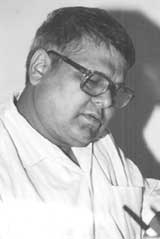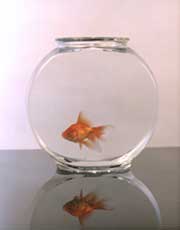 Anyone who has spent time in a city bigger than (metropolitan!) Kathmandu knows that life in Nepal can sometimes feel like life in a fishbowl. Small events stir great passions; minor achievements take on grand proportions; and unexceptional people gain the kind of stature that should be reserved for world-class celebrities or geniuses. It is easy, in small towns like Nepal's, to become insular and self-absorbed, and to forget that the rest of the world is marching ahead at a brisk pace.
Anyone who has spent time in a city bigger than (metropolitan!) Kathmandu knows that life in Nepal can sometimes feel like life in a fishbowl. Small events stir great passions; minor achievements take on grand proportions; and unexceptional people gain the kind of stature that should be reserved for world-class celebrities or geniuses. It is easy, in small towns like Nepal's, to become insular and self-absorbed, and to forget that the rest of the world is marching ahead at a brisk pace. In the story translated below, writer Dhruba Chandra Gautam captures, with wit and dexterity, the nature of a small-town society where even the most unremarkable occurrence spawns tall tales, avid gossip and widespread rumour-mongering. Gautam is an important modern writer of Nepal, a prolific creator of experimental, open-ended fiction. This story is more linear than most of his work. It is originally found in the collection Gautamka Pratinidhi Kathaharu.
 HEM SUBBA ATE PAAN
HEM SUBBA ATE PAAN Hem Subba was new in town. But when the short man walked down the paved road clacking his heels, many of the town's shopkeepers bent low to offer him their namaskar. He too was well-bred, and made sure to please everyone by returning their greetings. In fact the reason he didn't ride a car was that a car hindered him from making direct contact with the people.
Hem Subba became renowned overnight through the town. Tales about his personality spread in out-of-the-way corners. His short profile covered the entire urban landmass. Word spread of the politeness of his speech, and praises were sung about the courtesy of his manners. His liberalism was immense. Much talk was generated on the matter of his ways and habits. Hem Subba doesn't ride a car. Hem Subba wears thick eyeglasses. Hem Subba never touches money with his hands. Hem Subba doesn't wear a watch. Hem Subba doesn't drink liquor or smoke cigarettes. Hem Subba doesn't have a wife.
Leaving aside his habit of wearing eyeglasses for a moment; for each of his ways, there were alternative ways:
Hem Subba doesn't ride a car; he's rich enough to ride a Jeep.
't touch money with his hands; his pockets are filled with coins.
Hem Subba doesn't wear a watch; he carries a gold chain watch instead.
Hem Subba doesn't drink liquor; beer does the trick for him. He satisfies his cravings for cigarettes by smoking cigars instead.
Hem Subba doesn't have a wife (she died in a delivery case); there are pictures of four or five young women in his photo album.
Meaning, though there was some measure of renunciation in his ways, it was not possible to view him as extraordinary or strange. Do people become extraordinary merely because they are talked about? Hem Subba was an ordinary, healthy man. But for his slight stammer, his words were pleasant to hear. But it is true that one or two of his habits were odd. For instance, Hem Subba never ate paan.
Now paan was all the rage in the town. Everyone's mouth was stained red. Hem Subba sometimes deigned to chew betel nuts, but he never ate paan. Betel nuts alone, however, do not add to the beauty of one's mouth.
There was a rich merchant in the town, who was very amicable about eating and feeding others paan. He saw that Hem Subba was breaking the town's tradition: the culture was about to erode.
On the day of the spring festival of colours, the merchant arranged large rolls of paan on a stainless steel plate, and made a request: "Hajoor, you must try this today."
Hem Subba was inflamed: "Don't you know that I never eat paan? I don't want to look like I've rubbed blood on my mouth by eating paan. Paan causes cancer, return that plate at once!"
Hem Subba put on some red abhir powder, and chewed some cloves and cardamoms, but he did not eat any paan. The merchant got quite worried; was the town's culture doomed to erode, then?
He made a second attempt. He invited Hem Subba to his daughter's wedding. Hem Subba came. The merchant placed cloves and cardamoms on a silver plate, then decorated it with yellow rolls of paan. He said, "Hajoor, on the occasion of my daughter's wedding, some special paan."
This time Hem Subba spoke calmly, "Sahuji, paan does not suit my health, thank you, I'll have the cloves and cardamoms."
The merchant offered him the cloves and cardamoms.
Then the time came for Hem Subba's daughter's wedding. Hem Subba looked very worried: what was he to do, how was he to proceed? Marrying off a daughter is as difficult as fighting the Mahabharat wars. One must consider one's own good name, as well as the good names of the town's important people by inviting them all. Massive preparations got on way.
Two days before the wedding, the merchant appeared and asked, "Hajoor, might I be of any service?"
"There's nothing particular for you to do, Sahuji, though it's natural, of course, that I be worried," Hem Subba said.
"No need to worry, Hajoor," said the merchant. "We are always there for you. How could the marriage of your four daughters diminish your resplendent wealth? And even if your wealth were diminished, it would be replenished by the gods, if they so pleased."
For a while there was talk of other matters related to the wedding. After this, the merchant slowly took out a plate, this time of gold. Well, maybe it was just gold-plated, or maybe it was really gold. The merchant had also brought along some paan. He arranged a few rolls on the plate. These were silver-coated paans giving off the fragrance of roses.
The merchant said, "Eat these, hajoor, you must enjoy yourself at the time of your daughter's wedding. Your daughter is my daughter too, after all."
The merchant had spoken extremely warmly, in a way that touched the heart. Hem Subba hesitated, "But Sahuji, perhaps this will cause some harm?"
"No, hajoor, it will cause no harm at all. I've fed paan to some very important people, and it's never harmed anyone. Paan increases blood, it digests food. Just try eating one, this once."
This time, Hem Subba pulled the plate towards himself. He put one paan in his mouth, and experiencing its taste and the pleasure of its juices, he said, "Sahuji, I never knew in all my days that paan could be so juicy!"
The merchant smiled and said, "There was just this one flaw in your ways, hajoor. In all other respects, you were a diamond, an absolute diamond."
"So when will you feed me paan next, Sahuji?"
"I'll attend to it at once, hajoor," the merchant said, placing his hand in his pocket.
This time Hem Subba took a double helping, and put it in his mouth, looking very pleased. He ordered the merchant never to come to his house without bringing some paan. Then he strode towards the jeep that the merchant had prepared for him to go shopping for his daughter's wedding.


